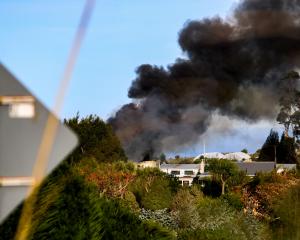That's the question asked by Chief Coroner Judge Neil MacLean following the release yesterday of a hard-hitting report on huffing-related deaths. Sixty-three people have died in butane inhalation-related incidents since 2000.
Community angst over graffiti prompted the Government to introduce a range of preventive measures in 2008; including restricting the sale of spraycans to minors.
However, coroner recommendations concerning huffing - including a public education campaign, introducing nationwide substance abuse centres, specialist drug training for teachers and regulating the availability of products that could be abused - have prompted little or no response from government agencies, according to Judge MacLean.
"It raises an interesting question: do we rate property more than we do life?"
Judge MacLean's report was prompted following an incident where two Mosgiel teenagers suffered serious burns after an lpg bottle they were huffing from exploded on July 2.
"It was the final straw. I fully confess the issue was not high on my radar as an area of particular concern until that happened," Judge MacLean said.
"When we started to look into it, I realised the problem was bigger than I appreciated."
His report highlighted the huffing deaths in New Zealand since 2000, but the "hidden iceberg" was the overall impact on young people.
"What we don't really know is the vastly more substantial number who have got brain impaired function, or simply because of constantly using this stuff aren't managing well, dropping out of school, not able to hold down a job, losing friendship, and alienated from their parents."
Judge MacLean said government agencies were best placed to act on the contents of the report.
"This is an insidious and extremely dangerous activity that is predominantly killing young males."
His review looked at other countries - such as in North America, Australia, Canada and the United Kingdom - and New Zealand did not compare well in terms of preventing huffing deaths.
"We can hardly hold our hand up and say we're leading the charge on dealing with this. We're not," Judge MacLean said.
Social Development Minister Paula Bennett said yesterday she was not convinced her ministry should lead any such response, while Minister of Health Tony Ryall had not read the report.
The Child and Youth Mortality Review Committee has repeated calls for an inter-agency approach to prevent volatile substance abuse-related deaths.
Chairman Dr Nick Baker said a co-ordinated approach across many sectors was needed, including reducing sales and access to butane-based products, voluntary control of butane by retailers, and education strategies.
New Zealand Drug Foundation executive director Ross Bell said the report served as a "wake-up call".
"Sadly, previous coroners' recommendations have been ignored and even some government agencies have passed the buck. That cannot be allowed to continue," Mr Bell said.
Huffing deaths
• 63 deaths since 2000.
• More than 75% were male.
• Almost 50% were Maori.
• More than 87% were aged under 24 years.
• Youngest: 12-year-old boy.
• Oldest: 76-year-old man
Advertisement













